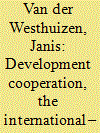|
|
|
Sort Order |
|
|
|
Items / Page
|
|
|
|
|
|
|
| Srl | Item |
| 1 |
ID:
165284


|
|
|
|
|
| Summary/Abstract |
Development cooperation is a foreign policy tool marked by deep-seated conflicts of interest and dilemmas of particular relevance to second-tier and non-nuclear countries that aim to change their international status and role. Building on the concept of ‘graduation dilemma’, this article compares specific dilemmas that Brazil and South Africa face in their foreign policies concerning the development cooperation agenda at three levels: the domestic, the regional and the global level. The research question guiding this analysis is: how does the graduation dilemma manifest in relation to Brazil and South Africa’s role in development cooperation?
|
|
|
|
|
|
|
|
|
|
|
|
|
|
|
|
| 2 |
ID:
165283


|
|
|
|
|
| Summary/Abstract |
This article questions whether the European Union (EU) strategy of using free trade agreements (FTAs) as tools of democracy promotion is, currently, normatively coherent and legitimate. It focuses on FTAs with proximate autocracies and makes four main claims. First, FTAs raise significant legitimacy concerns in that they can ordinarily be expected to generate both economic ‘winners’ and ‘losers’ in the target country without democratic processes in place to legitimate these costs. Second, the EU risks empowering autocrats (rather than catalysing democratic transition) in the way it negotiates FTAs. Third, ‘leverage’ strategies of withholding or suspending cooperation as a result of violations of democratic and human rights norms are applied inconsistently by the EU, undermining leverage credibility. Fourth, the best-case impact of regulatory convergence with the EU acquis communautaire on the democratic character of sector-level policymaking is mixed: increased transparency and accountability can improve democratic credentials, while, paradoxically, increased stakeholder participation is normatively suspect in the absence of a democratic framework.
|
|
|
|
|
|
|
|
|
|
|
|
|
|
|
|
| 3 |
ID:
165285


|
|
|
|
|
| Summary/Abstract |
The political science and international relations literature has extensively analysed the role of norm entrepreneurs, states, and international institutions as relevant actors generating norm transformation. However, although social movements’ reliance on courts to address core social problems has become a significant phenomenon, the role of the litigation process of social movements in norm transformation is understudied. Social movements have an ambiguous relationship with litigation. On the one hand, social movements perceive litigation to be the tool of the powerful, reproducing the status quo; on the other hand, it is argued that even when social movements lose their cases before the courts in the short term, legal mobilization can provide longer-term achievements. This article constructs a theory about the process through which the litigation of social movements impacts norm transformation. It proposes four mechanisms through which litigation plays a role in norm transformation: legal framing, legal interpretation, precedent setting and public attention. Through the examination of the Sardar Sarovar Dam as a case study, the analysis reveals that the role of the litigation process of social movements in norm transformation depends on how litigation mechanisms impact norm transformation in specific cases.
|
|
|
|
|
|
|
|
|
|
|
|
|
|
|
|
| 4 |
ID:
165286


|
|
|
|
|
| Summary/Abstract |
This article argues that Donald Trump’s Asian strategy hardly marks a radical transformation from Barack Obama’s ‘pivot to Asia’. This is because the ‘pivot to Asia’ never really existed. Although Obama was successful in building legitimacy for the strategy through international norms, he failed to translate his lofty rhetoric into practice. Much of his original pivot components (building a constructive relationship with China, coordinating with Asian allies and multilateralism in the Association of South East Asian Nations and the Trans-Pacific Partnership) has either failed or did not live up to expectations. Donald Trump was adamant that the Asian pivot was a bad strategy and that he would not follow it. But although he completely discarded Obama’s legitimization of the rebalance (as Trump speaks pragmatically and does not care about international norms), in actuality he has followed many of Obama’s policies, and even improved on some of them. That being said, Trump’s ‘pivot actions’ appear to be erratic, pragmatic short-term actions rather than a meticulously planned long-term strategy similar to Obama’s rebalance (which did not materialize). Thus, while Obama failed to transform the pivot into an effective strategy, neither is Trump’s effectiveness backed by a coherent Asian strategy.
|
|
|
|
|
|
|
|
|
|
|
|
|
|
|
|
|
|
|
|
|